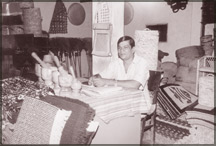|
DAILY NEWS ONLINE |
|
|
|
OTHER EDITIONS |
|
|
|
|
|
|
|
|
|
OTHER LINKS |
|
|
|
|
|
|
 |
Mercantilism strikes back
|
|
|
Tariffs and non-tariff barriers were the conventional and customary measures resorted to in continuing international trade inequality - openly flouting ethical considerations.
However, the same is discreetly operative taking cover under non-conventional barriers among which are voluntary export restraint, health and environmental regulations, local content requirements - red tape, and customs procedures resulting in delays and loads of paper work at Customs.
Talking to the Daily News recently was Colombo University's senior economist Dr. M. Ganeshamoorthy who recalled an interesting incident on voluntary export restraint.
US car industrialists during President Ronald Reagan's time were pushing him into quota and conventional barriers on Japanese car imports as more and more Americans were frantically switching over to light weight, energy saving and cost-effective Japanese cars.
Strong free trade supporter Ronald Reagan being reluctant to take such trading measures called for a restriction of such exports from the visiting Japanese Trade Minister and reminded him that the failure to do so would be a compulsion into trade barriers - a sort of sugar-coated pill.
Two other non-conventional barriers are health and environmental regulations - most hurtful to particularly less developed countries.
Accordingly, these countries are called upon to meet demanding conditions laid down by developed countries when resorting to exports making Third World exports a near non-reality, contradicting the world economic policy of import substitution and export promotion.
To keep a country's exports 'alive' and 'thriving' that country is compelled into raw material purchases from the importing one. For instance an European country exporting school buses to the US was imposed a conditional purchase of a percentage of US raw material.
US credentials on world trade, increasingly questionable, hinders free trade though it professes free trade.
The duplicity is evident in much of its trade dealings.
The United States' performance in Japan and Western Europe steel imports bringing on a 30 per cent surcharge - reportedly a protective cover for its steel workers and Netherland's withdrawal of dairy farmers' subsidy when they washed the streets with milk and the re-introduction of such subsidy proves a salient point - the non-realisation of full blown international tradebased on equality and justice.
In fact both Western and Japan's indictment against the US surcharge took one full year for hearing time during which time US removed trade tariffs.
Tracing the many economic models - from pre-Adam Smith era to the present day import-export based trading, Dr. Ganeshamoorthy described how one followed the other without much success.
Mercantilism emphasised the value of exports over imports and the accumulated surplus of silver and gold to be used towards a strong naval build up. Thus the gold rush was evident during colonial times when nations were at war in empire building.
Following this period was the Laissez Faire times when Adam Smith propagated the 'let people decide' concept.
The amassing of wealth by some countries only at saturation point brought the world economy to a break down. However this 1776 economic model insisted trade not to be a zero-sum game. It insisted upon international trade benefiting both countries and that protectionist policies over industries was not needed.
Both exports and imports depended on cost advantages - which policy was a sharp departure from the mercantilist model.
However the great economic depression of 1930s motivated British economist Keynes who recommended government's involvement in the economy to correct market failures and arrive at greater economic growth. These were times of inward oriented economic policies.
Singapore, Taiwan, Malaysia, South Korea - all of which had authoritarian regimes engaged an economic boon which brought to writer's mind the many human rights violations incurred to arrive at such prosperity.
Japan manouvred the Buddhistic requirement of the mind and mental discipline for economic growth - the very ingredients Buddha emphasised for renunciation.
Certainly, whatever methods resorted to, the East Asian Tigers were advocated by international donor agencies as role model for other countries.
Answering a question on the failure of inward looking economic policies in Sri Lanka, Ganeshamoorthy said ceremonial Buddhism prevalent here prevented that kind of economic growth, as in Buddhist Japan.
However, the Keynesian model he noted favoured developed countries over the developing ones. While the developing countries' exports are and still continue to be agricultural and primary products, the developed world exports were industrial products and intermediate goods.
So, the developing countries' prices often fluctuated whereas the developed world's exports kept rising. Keynes, therefore, advised industrialisation for developing countries. Wealth was the control of a few and the great economic boom led to a worldwide economic recession.
Currently on, is the substituting and export promoting model - a mixture of both government control and market-driven economies.
This current trend is seen by Dr. Ganeshamoorthy as the re-emergence of mercantilism.
If the earlier mercantilist model through colonialism helped naval build up of some countries into world powers, today's neo-colonial repetition of such model undoubtedly facilitates some countries into strong economies at the expense of the weak which brought to writer mind the clechetic yet apt saying 'Survival of the fittest'!
|
|
 |
|||
|
|||
|
|
|||
 |
|||
 |
|||
 |
|||
 |
|||

